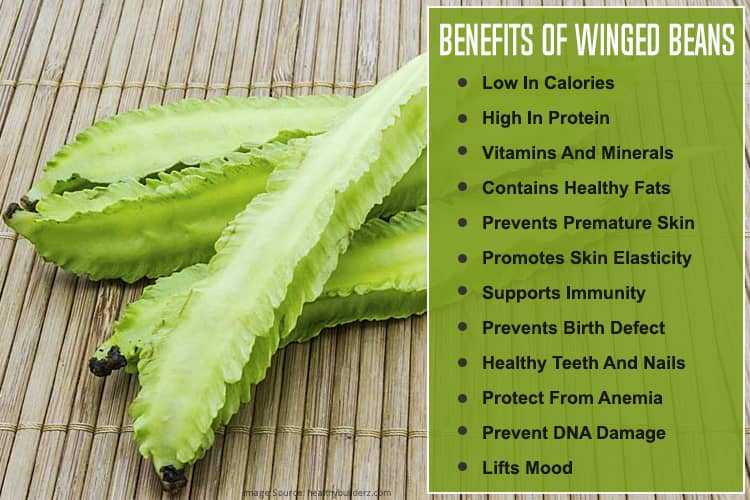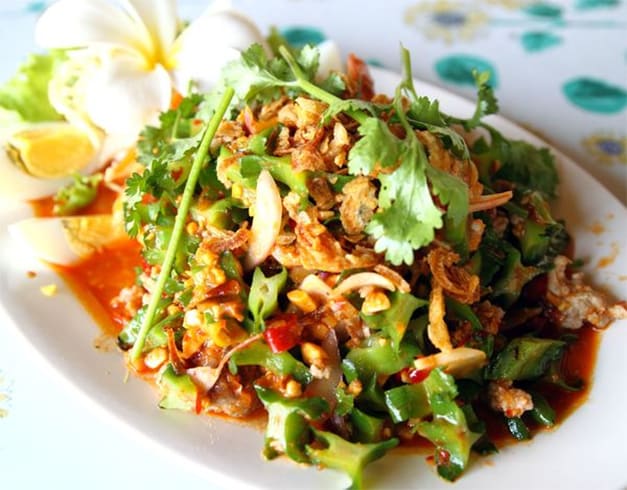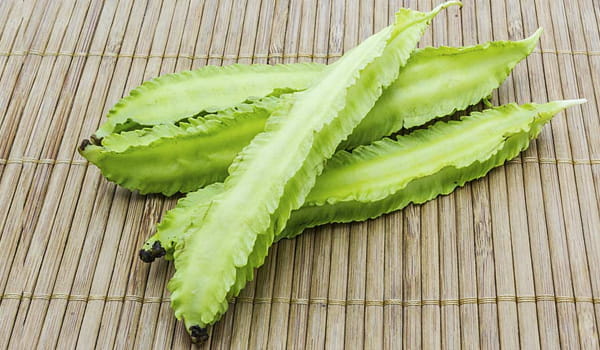Winged beans are also known as asparagus bean. The Goa bean, princess pea, or the four-angle-bean can promote health and a balanced diet that is also budget-friendly. All parts of this plant, including leaves, seeds, stems, flowers, and tubers are edible and contain medicinal properties to improve health internally and externally. The veggie is packed with nutrition and offers several benefits.

The scientific name of winged beans is also known as Psophocarpus tetragonolobus.
The other parts of winged beans are packed with rich content of protein, vitamins, and minerals. These beans are also a great source of Vitamin A. This is one veggie that produces a healthy dose of nutrients to our body.
Be it our health or external beauty, winged beans greatly benefits our overall health.
Nutritional Value of Winged Beans
The tender, immature pods of winged beans are considered as one of the low-calorie vegetables. 100 grams of winged beans contain about 49 calories. The mature winged bean seeds however contain 409 calories per 100 gram and comprises of relatively high protein content, equal to that of soybean protein.
The fresh, young bean pods are considered to be the finest sources of folate. 100 gram of beans provide 66 µg or 16.5% of daily requirement of folate. The folate, along with Vitamin B-12 is one of the important components of DNA synthesis and cell division. The adequate folate in the diet around conception and during pregnancy can help in preventing neural-tube defects in the new-born baby.
The fresh winged beans are packed with Vitamin-C. 100 gram beans provide 18.3 mg or 31% of Vitamin-C, which is an effective antioxidant. When vitamin is adequately included in the diet, it can build immunity against infections, maintain blood vessel elasticity, and offer protection against cancer.
Winged bean leaves are an excellent source of fiber, vitamin-C, vitamin-A, and minerals. 100 g of fresh leaves provide 45 mg of vitamin-C (75% of recommended daily value) and 8090 IU of vitamin-A (270 % of RDA).
Winged bean tubers are also rich sources of starch, protein, and B-complex vitamins. 100 g of root provides 11.6 g of protein in comparison to 2.02 g/100 g and 1.36 g/100 g protein content in potato, and cassava respectively.
See the table below for in-depth analysis of winged beans nutrition:
| Principle | Nutrient Value | Percentage of RDA |
|---|---|---|
| Energy | 49 Kcal | 2.5% |
| Carbohydrates | 4.31 g | 3% |
| Protein | 6.95 g | 12% |
| Total Fat | 0.87 g | 3% |
| Cholesterol | 0 mg | 0% |
| Vitamins | ||
| Folates | 66 µg | 16.5% |
| Niacin | 0.900 mg | 6% |
| Pantothenic acid | 0.059 mg | 1% |
| Pyridoxine | 0.113 mg | 6% |
| Pantothenic acid | 0.059 mg | 9% |
| Riboflavin | 0.100 mg | 8% |
| Thiamin | 0.140 mg | 12% |
| Vitamin A | 128 IU | 4% |
| Vitamin C | 18.3 mg | 30% |
| Electrolytes | ||
| Sodium | 4 mg | <1% |
| Potassium | 240 mg | 5% |
| Minerals | ||
| Calcium | 84 mg | 8% |
| Copper | 0.051 µg | 5.5% |
| Iron | 1.5 mg | 19% |
| Magnesium | 34 mg | 8% |
| Manganese | 0.218 mg | 9% |
| Phosphorus | 37 mg | 5% |
| Selenium | 1.5 µg | 3% |
| Zinc | 0.39 mg | 3% |
Benefits of Winged Beans:
Listed below are 12 winged beans health benefits to explain how it works on our body both internally and externally.
1. Low In Calories
The tender immature pods of winged beans are said to be low in calories. One 100 grams serving of the winged beans contain about 49 calories. But, the mature seeds provide around 409 calories in every 100 grams. Those who wish to lose their weight can include the immature seeds in their daily diet.
2. High In Protein
Winged beans are a good source of protein. There are studies which prove that legumes when consumed with corn and winged beans can provide a high protein milk value. This can adequately nourish an infant lacking protein in the body.
3. Vitamins And Minerals
Winged beans contain a rich amount of essential minerals like iron, manganese, calcium, copper, phosphorus, and magnesium. They also contain a high amount of Vitamin A which is an effective antioxidant that prevents DNA damage. Winged beans are also packed with a rich amount of Vitamin B. These essential Vitamins can further improve mood, energy, and vitality. The Vitamin E present in unsaturated oil is also present in unsaturated oil, which is derived from these beans.
4. Contains Healthy Fats
All fats are not harmful for our health. The body also needs good fat, which are essential for the body. The winged beans contain a high amount of saturated fats, mono-saturated fats, and polyunsaturated fat. All these work together to promote a healthy body.
5. Prevents Premature Skin
Winged beans are packed with Vitamin C and Vitamin A. Both these vitamins act as antioxidants to prevent premature signs of ageing, like wrinkles and fine lines on the skin.
6. Promotes Skin Elasticity
The high content of antioxidants present in winged beans plant can ensure that the skin maintains its elasticity and makes it look younger.
9. Healthy Teeth And Nails
Calcium is essential for keeping teeth and nails healthy. And winged beans is said to have a high content of calcium. Consuming this veggie daily can prevent tooth decay, gum related problems, brittle nails, etc.
10. Protect From Anemia
The folic acid present in these grains is important for eliminating anemia. Winged beans should be taken along with supplements to keep mind and body healthy.
11. Prevent DNA Damage
Winged beans are packed with Vitamin A, which acts like an effective antioxidant to prevent DNA damage in the body.
12. Lifts Mood
Winged bean seeds contain high amounts of Vitamin B. These winged beans seeds can help in improving energy levels, mood, and vitality.
Selection and Storage of Winged Beans:
Winged beans are available widely in the market all-year-round in tropical regions. The beans are generally known by the local names like ‘kacang botol’ in Malaysia and ‘kecipir’ in Indonesia.
Besides its young pods, almost all parts of the bean plant including its crispy leaves, flower blossoms, tender shoots, and underground tubers are used in several cuisines.
While selecting winged beans in the local markets, choose tender, immature pod with shiny green surface and light green chewy peas inside. Do not go for over-mature or overripe beans as they tend to have unappetizing flesh and dry seeds inside.
At home, winged beans can be taken while fresh to relish its full natural flavor. Or else, store them in the refrigerator, like French beans, in a plastic bag up to a maximum of four days.
How to Prepare Winged Beans
Wash the winged beans well in cold water and dry off the excess water using a paper towel. Trim off the tip ends of the winged beans. Chop the beans diagonally into small section using paring knife. The dried winged bean seeds can also be cut in the same manner as other peas and dry beans.
The shoots and flowers of winged beans can be added in stews and stir-fries. The winged bean tubers have a nutty flavor because of their high protein content. It can be added to stews and stir-fries as well.
Here are few serving tips of winged beans:
Tender winged bean pods are a delicacy used in every household. Their sweet, chewy, and earthy flavor is similar to asparagus.
- Winged beans are common ingredients in Indonesian, Vietnamese, Cambodian, and Malaysian cuisine.
- The finely chopped beans can be added into salad, sambal, and can also be stir-fried.
- Whole immature pods can be grilled and seasoned using oil, pepper, and salt.
- The winged bean seeds can be eaten roasted or added to stews. Steamed or Sautéed, winged beans can be served as a side dish alongside fish, poultry, and seafood.
- The tender leafy greens and shoots can be cooked in stews and stir-fries.

Source: 12tomatoes.com
Side Effects of Winged Beans
Winged beans are considered safe for all. But, individuals with immune-allergy toward legumes and G6PD-enzyme deficient disease should avoid taking winged beans.
Winged beans contain oxalic acid, a naturally occurring substance present in vegetables which may crystallize as oxalate stones in the urinary tract. Hence, individuals with known oxalate urinary tract stones are advised to avoid taking vegetables belonging to Brassica and Fabaceae family.
You are advised to drink adequate amount of water to maintain normal urine output and also to avoid stone risk.
Winged beans contain a wide spectrum of compounds which are beneficial for our health. These beans are available all year round. The pods are preferably consumed while fresh, to relish their natural flavor. How do you like to have your winged beans? Do you have a favorite recipe? Share with us in the comments section below.
